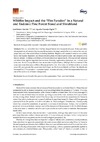Identificador persistente para citar o vincular este elemento:
https://accedacris.ulpgc.es/jspui/handle/10553/55511
| Título: | Wildfire impact and the "Fire Paradox" in a natural and endemic pine forest stand and shrubland | Autores/as: | Arévalo, José Ramón Naranjo Cigala, Agustín |
Clasificación UNESCO: | 2417 Biología vegetal (botánica) | Palabras clave: | Canary Islands Fire paradox Fire suppression Pinus canariensis forests |
Fecha de publicación: | 2018 | Publicación seriada: | Fire (Basel) | Resumen: | Fire is a powerful force that has shaped forests for thousands of years. It also provokes widespread social concern due to possible economic damage, social effects, impact on homes and properties, and other social effects including fatalities. Regions with seasonal variations in aridity have a fire regime dependent on climate resulting from the role of precipitation and temperature in fire occurrence, implying a synchrony of fire occurrence at regional scale. This spatial and temporal variation of fire regimes regulates the structure, diversity, regeneration dynamics, and nutrient cycle of an area. In the Canary Islands, fires are recurrent in pine forests, although their occurrence in the same area more than once within a 20-year period is rare. The main aim of this work is to reveal, over a 50-year period, fire occurrence and impact on the Canary Islands and how the islands are immersed in a “fire paradox”—a process typical of protected areas, where fire suppression becomes one of the main aims of forest management. | URI: | https://accedacris.ulpgc.es/handle/10553/55511 | ISSN: | 2571-6255 | DOI: | 10.3390/fire1030044 | Fuente: | Fire (Basel) [ISSN:2571-6255], v.1 (3), p. 44 |
| Colección: | Artículos |
Citas de WEB OF SCIENCETM
Citations
17
actualizado el 22-feb-2026
Visitas
347
actualizado el 15-ene-2026
Descargas
165
actualizado el 15-ene-2026
Google ScholarTM
Verifica
Altmetric
Comparte
Exporta metadatos
Los elementos en ULPGC accedaCRIS están protegidos por derechos de autor con todos los derechos reservados, a menos que se indique lo contrario.
